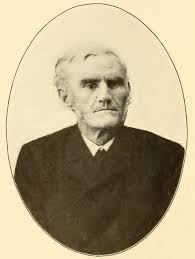


W.O. Cushing
Repertoire:
Under His Wings
When He Cometh
Ring the Bells of Heaven
Hiding in Thee
Down in the Valley (Follow On)
(December 1823 – October 1902)
William Orcutt Cushing was born in Hingham, Massachusetts, a few miles south of Boston, December 31, 1823. His parents were Unitarians but as he began to read the Bible and think for himself, he sensed his need of a Savior. He left that group and joined a local Christian Church and later joined with the Wesleyan Methodist Church. Throughout his adult life the assurance of God’s protection and care was something Cushing knew personally, wrote about, and preached about.
In his late teens as he read and studied his Bible, he began to believe that he had a call from God to the ministry and began studying for that. After completing his education, he accepted the call to his first pastorate at Searsburg, N.Y which is located about 15 miles northwest of Ithaca. While there he met, fell in love with, and married his wife, Miss Rena Proper. They were married on February 4, 1854, and began planning for their future in God’s work. By all accounts she proved to be a great help to him in his ministry as they served together in several churches located in the northwest area of New York state. They were in the prime of their life and career, doing what they believed God had given them to do but it was during these years of faithful work that his wife’s health began to fail. They returned to Searsburg, N.Y. where he again served as pastor for several years while taking care of his wife through her illness. After a long period of illness, she died in July 1870.
But that was not the end of his challenges. Soon after his wife’s death, a creeping paralysis began in his throat and vocal cords that left him unable to speak. Not yet fifty years old when his disability began, and despite all that had transpired, Cushing did not give up on doing something for God. His prayer became, “Lord, still give me something to do for Thee!” He still believed in his heart that God had called him to some specific task and that in His own time, God would open that door for ministry. Happily, for us, God did answer that prayer. He did not remove the paralysis, but He opened the door to a whole new ministry that extended his influence for Christ in a way he could not have imagined. With the answer God provided, he would reach not just hundreds or thousands, but millions of people into time far beyond his life-span. He found that God had given him the ability to write songs and hymns.
Rev. Cushing eventually wrote more than 300 gospel songs many of which are still in use today. Most, if not all, of his ideas came to him as he studied his Bible. His first published song seems to be “Jewels” aka “When He Cometh.” This song was written in 1856 and he noted that it was based upon Scripture he was reading in Malachi and Zechariah at the time. He wrote the song for the Children’s Sunday School at the Searsburg Church. His journal notes that “Ring the Bells of Heaven,” was written in 1866. He noted that the song came to him one Sunday afternoon while listening to local church bells ringing out after a baptismal service.
“Hiding in Thee” was written in 1876 at the request of Ira Sankey who asked that Cushing write something to help in his preaching of the gospel. Mr. Cushing wrote: “It must be said of this hymn that it was the outgrowth of many tears, many heart-conflicts, and soul-yearnings, of which the world can know nothing. The history of many battles is behind it.”
Pastor Cushing always turned to the Psalms for comfort throughout his life and ministry and especially so during his wife’s illness and death. He was encouraged by others as they preached sermons on familiar words and popular ideas such as “When God is There.” But his experiences led him to consider those times when God seemed silent. A few years after his wife’s death he was praying for direction, to know he was following Christ in all his life’s dealings. He may have been wondering when he would hear a sermon on “How to find God in life’s valleys.” As he considered these things, Cushing was inspired to write a gospel song that could have been his autobiography. He thought of King David as he wrote in Psalm Twenty-Three, “Yea, though I walk through the valley of the shadow of death, I will fear no evil for Thou art with me.” His notes indicate that it was that verse, rather than the ones referring to the mountaintop meetings with God or the soaring up on the wings of eagles, that sustained him during his months of loneliness and adjustment. He titled his song “Follow On“(1878). The song is also known as “Down in the Valley” and Cushing later said that “it was written with prayer and the hope that some heart might by it be led to give up all for Christ.”
It may be true that we sometimes hear more sermons or lessons about all the positives that God wants us as His children to have and experience. And there are times that God’s presence seems to be everywhere all around us actively blessing and directing other’s steps and lives. From his experience, Cushing knew that God would lift him up above the shadows and trials of life. He knew that as Christians, we are bound for a higher ground, but what about the times when He seems to be silent? Once, emerging out of his own personal “valley of sorrow” undiscouraged and determined to serve God and make his “life count for Jesus,” the preacher began to write about the thoughts he believed God was giving him. The resulting song, “Under His Wings (1896)” was based on the words he had read in Psalm 17:8, “Keep me as the apple of Your eye; hide me under the shadow of Your wings,” and Psalm 91:4 “He shall cover thee with His feathers, and under His wings shalt thou trust.” His notes show that he was reflecting upon his experiences and of God’s strength and blessings that brought him through each trial.
At last, unable to support himself, Cushing spent the last several years of his life in the home of a friend, Rev. and Mrs. E. E. Curtis, Lisbon Center, N.Y. But from the day he wrote “When He Cometh” as a young man of thirty-three until he wrote “Under His Wings” as a mature Christian of seventy-three, Rev. W. O. Cushing tried to do the “something” God had given him to do: Songs of the promise of heaven; Songs for a daily Christian life of strength, hope, love, faith, and perseverance.
Under His Wings
Under His wings I am safely abiding,
Though the night deepens
and tempests are wild,
Still I can trust Him;
I know He will keep me,
He has redeemed me, and I am His child.
Bibliography:
A Treasure of Hymns; Brief Biographies of 120 Leading Hymn-writers and Their best Hymns; Wells, Amos R.; Boston; W. A. Wilde company, 1945.
American Hymns Old and New; Hughes, Charles William; New York, Columbia University Press, 1980.
Biography of Gospel Song and Hymn writers; Hall, Jacob Henry; New York, AMS, 1914.
High Lights on Hymnists and Their Hymns; Goodenough, Caroline; New York, AMS Press, 1974; reprint of 1931 version.
My Life and Sacred Songs; Sankey, Ira D.; London, Hodder and Stoughton, 1906.
